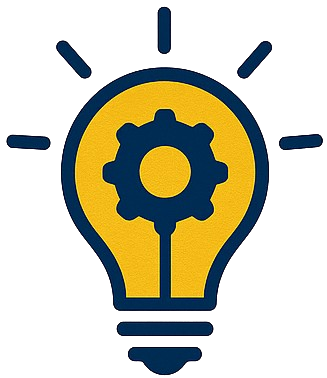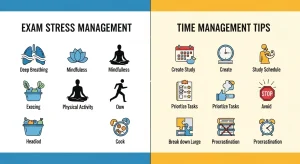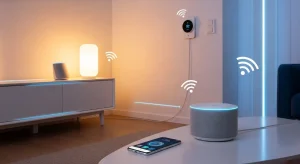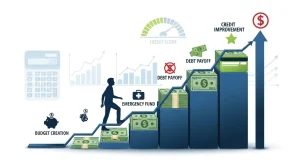Managing stress and anxiety has become more crucial than ever in our fast-paced world. Stress and anxiety management techniques are essential tools for maintaining mental health and overall well-being. Effective techniques for stress management are varied and typically include behaviors that improve physical health, such as nutrition and exercise, but may also incorporate strategies that improve cognitive and emotional functioning.
Whether you’re dealing with everyday pressures or chronic anxiety, implementing proven stress management techniques can significantly improve your quality of life. This comprehensive guide explores evidence-based methods that you can start using today to find relief and build resilience.
Online Therapy and Counseling Resources: Your Complete 2025 Guide to Virtual Mental Health
Understanding Stress and Anxiety: The Foundation for Management
Before diving into specific techniques, it’s important to understand how stress and anxiety affect your body and mind. Relaxation techniques are therapeutic exercises designed to assist individuals with decreasing tension and anxiety, physically and psychologically. When you understand the stress response, you can better choose which anxiety management techniques will work best for your situation.
The Physical and Mental Impact of Stress
Chronic stress and anxiety can lead to:
- Elevated heart rate and blood pressure
- Muscle tension and headaches
- Sleep disturbances and fatigue
- Difficulty concentrating
- Weakened immune system
- Digestive issues
Evidence-Based Breathing Techniques for Immediate Relief
One of the easiest ways to reduce stress is to simply focus your attention on your breath. It’s a form of “entry level” meditation that anyone can do. Breathing exercises for stress are among the most accessible and effective stress relief techniques available.
1. The 4-7-8 Breathing Technique
By inhaling through your nose for four seconds, holding your breath for seven seconds, and exhaling through your mouth for eight seconds, you help to engage your parasympathetic nervous system, your relaxation and digestion system, which can help calm the body and mind.
How to Practice:
- Sit comfortably with your back straight
- Inhale through your nose for 4 counts
- Hold your breath for 7 counts
- Exhale through your mouth for 8 counts
- Repeat 3-4 cycles initially
2. Box Breathing (4-4-4-4 Method)
One simple deep breathing technique is known as box breathing. It’s named this because the exercise’s 4 steps make a box shape. This technique is particularly effective for managing acute anxiety.
Steps:
- Inhale for 4 counts
- Hold for 4 counts
- Exhale for 4 counts
- Hold empty lungs for 4 counts
Daily Self-Care Routines: Transform Your 2025 With Simple Wellness Habits
3. Diaphragmatic Breathing
Practice diaphragmatic breathing for 5 to 10 minutes 3 to 4 times daily. When you begin, you may feel tired, but over time the technique should become easier and should feel more natural.
Mindfulness and Meditation for Long-Term Stress Management
The concept of mindfulness, which originates from practices of Buddhism, is defined as a focused awareness of one’s experience, and purposeful and nonjudgmental focus on the present moment. Structured interventions, such as the Mindfulness-Based Stress Reduction (MBSR) program, provide powerful tools for anxiety management.
4. Daily Mindfulness Practice
Mindfulness stress relief techniques include:
- Body scan meditation (5-10 minutes daily)
- Mindful walking in nature
- Present-moment awareness exercises
- Mindful eating practices
5. Progressive Muscle Relaxation (PMR)
This technique involves systematically tensing and releasing different muscle groups to achieve deep relaxation and reduce physical tension associated with stress.
Cognitive-Behavioral Techniques for Anxiety Management
Cognitive-behavioral therapy (CBT) is a first-line, empirically supported intervention for anxiety disorders. CBT refers to a family of techniques that are designed to target maladaptive thoughts and behaviors that maintain anxiety over time.
6. Thought Challenging and Reframing
Cognitive anxiety management techniques include:
- Identifying negative thought patterns
- Questioning the evidence for anxious thoughts
- Developing balanced perspectives
- Creating positive coping statements
7. Behavioral Activation
This involves scheduling pleasant and meaningful activities to counteract the tendency to withdraw when stressed or anxious.
Top 10 Meditation & Mindfulness Apps to Transform Your 2025 Mental Wellness Journey
Physical Movement and Exercise for Stress Relief
Getting more exercise, practicing mindfulness, spending time with a pet, minimizing screen time, and getting outside more often are all ways that you can reduce stress.
8. Regular Aerobic Exercise
Benefits include:
- Endorphin release for natural mood elevation
- Improved sleep quality
- Reduced cortisol levels
- Enhanced self-confidence
9. Yoga and Tai Chi
Several mind and body approaches, including relaxation techniques, yoga, tai chi, hypnotherapy, and meditation may be useful for managing symptoms of stress. These practices combine physical movement with mindfulness.
Lifestyle Modifications for Comprehensive Stress Management
10. Sleep Hygiene Optimization
Essential sleep practices:
- Maintain consistent sleep schedule
- Create relaxing bedtime routine
- Limit screen time before bed
- Keep bedroom cool and dark
11. Nutritional Support for Stress Management
Stress-reducing foods:
- Omega-3 fatty acids (fish, walnuts, flax seeds)
- Magnesium-rich foods (leafy greens, nuts, seeds)
- Complex carbohydrates for stable blood sugar
- Herbal teas like chamomile and passionflower
Functional Superfoods: Boost Your Health Naturally
Social and Environmental Stress Reduction Strategies
12. Digital Detox and Media Management
Take breaks from news and social media. It is good to be informed, but constant information about negative events can be upsetting.
Practical steps:
- Set specific times for checking news and social media
- Use “do not disturb” features
- Create phone-free zones in your home
- Practice the “STOP” technique when feeling overwhelmed online
13. Nature Connection and Outdoor Activities
Make time to unwind. Take deep breaths, stretch, or meditate. Keep a journal. Spend time outdoors either being active or relaxing.
Nature-based stress relief:
- Forest bathing or “shinrin-yoku”
- Gardening for therapeutic benefits
- Outdoor walking or hiking
- Beach or water activities
Creative and Expressive Stress Management Techniques
14. Journaling and Expressive Writing
Therapeutic writing practices:
- Daily gratitude journaling
- Stream-of-consciousness writing
- Worry time journaling
- Goal and intention setting
15. Art Therapy and Creative Expression
Creative outlets for stress relief:
- Drawing, painting, or coloring
- Music listening or creation
- Dancing or movement therapy
- Crafting or building projects
Healthy Desserts & Snacks to Satisfy Your Cravings
Quick Stress Relief Techniques for Emergency Situations
When you need immediate anxiety relief techniques, try these rapid-response methods:
| Technique | Duration | Effectiveness |
|---|---|---|
| 4-7-8 Breathing | 1-2 minutes | High for acute anxiety |
| 5-4-3-2-1 Grounding | 2-3 minutes | Excellent for panic |
| Cold water on wrists | 30 seconds | Quick physical reset |
| Progressive muscle relaxation | 3-5 minutes | Good for tension |
| Mindful observation | 1-2 minutes | Effective for racing thoughts |
Building Your Personal Stress Management Toolkit
Creating an effective stress management plan requires:
Assessment and Personalization
- Identify your stress triggers
- Recognize your early warning signs
- Choose techniques that resonate with you
- Start with 1-2 techniques consistently
Implementation Strategy
- Morning routine: Include 5-10 minutes of breathing or mindfulness
- Workday breaks: Use micro-techniques between tasks
- Evening wind-down: Practice longer relaxation methods
- Weekend intensive: Dedicate time to deeper practices
Luxury Steam Shower Rooms: Transform Your Bathroom Into a Spa
The Science Behind Effective Stress Management
Stress management techniques used by children and adolescents are important to reduce anxiety, stress, and depressive symptoms, improve social skills, reduce stress-related physical pain, and achieve academic improvement across settings and diagnoses.
Research consistently shows that regular practice of stress and anxiety management techniques can:
- Reduce cortisol levels by up to 30%
- Improve immune function
- Lower blood pressure and heart rate
- Enhance cognitive performance
- Increase emotional resilience
Creating Sustainable Habits for Long-Term Success
Weekly Practice Schedule
Monday-Wednesday-Friday: 10-minute morning breathing exercises Tuesday-Thursday: Evening progressive muscle relaxation Weekends: Longer mindfulness or nature activities Daily: Micro-practices during stressful moments
Tracking Your Progress
Monitor your stress management journey by noting:
- Stress levels (1-10 scale) before and after techniques
- Sleep quality improvements
- Mood changes throughout the day
- Physical symptoms reduction
Cryptocurrency & Blockchain: Revolutionizing Digital Finance
Frequently Asked Questions (FAQ)
What are the most effective stress management techniques for beginners?
The most effective stress management techniques for beginners include simple breathing exercises like the 4-7-8 method, basic mindfulness practices, and regular physical activity. Taking a deep breath is one of the easiest and most effective ways to relieve stress. Start with just 5 minutes daily and gradually increase duration as these practices become more natural.
How quickly do breathing exercises work for anxiety relief?
Breathing exercises for stress can provide immediate relief within 1-3 minutes of practice. The most common uses of 4-7-8 breathing are for reducing stress and anxiety. With frequent use, it reportedly becomes more effective in helping a person manage their stress levels. While immediate effects occur quickly, consistent practice over weeks provides more substantial and lasting benefits.
Can natural stress management techniques replace medication for anxiety?
While natural stress management techniques are highly effective, they work best as part of a comprehensive approach. Cognitive-behavioral therapy (CBT) helps individuals to eliminate avoidant and safety-seeking behaviors that prevent self-correction of faulty beliefs, thereby facilitating stress management to reduce stress-related disorders and enhance mental health. Always consult with healthcare professionals before making changes to medication regimens.
How long should I practice stress management techniques daily?
For optimal results with anxiety management techniques, aim for 10-20 minutes of formal practice daily, plus brief micro-practices throughout the day. When you have more time, you can do them for 10 minutes or more to get even greater benefits. Consistency matters more than duration – regular 5-minute sessions are more beneficial than occasional longer practices.
10 Easy & Healthy Breakfast Ideas to Boost Your Energy
Take Control of Your Stress and Anxiety Today
Implementing effective stress and anxiety management techniques is one of the most important investments you can make in your mental and physical health. The evidence-based methods outlined in this guide provide a comprehensive toolkit for managing stress in various situations and circumstances.
Remember, building stress management skills takes time and practice. Start with one or two techniques that resonate with you, and gradually expand your toolkit as you become more comfortable with these practices.
Ready to transform your stress management approach with proven, science-based techniques? Begin your journey toward better mental health and resilience with our comprehensive stress management resource kit.
– Get instant access to guided breathing exercises, meditation scripts, and a complete stress management workbook – start your transformation today!











